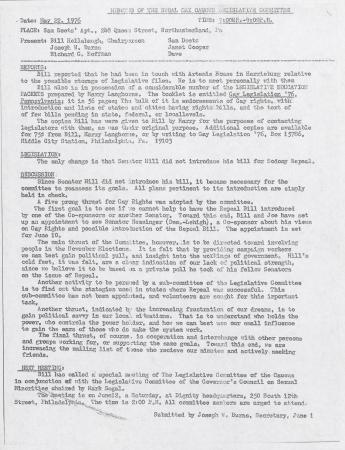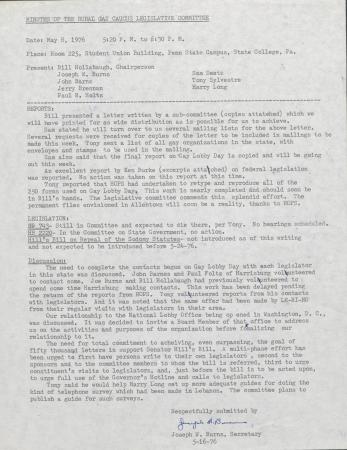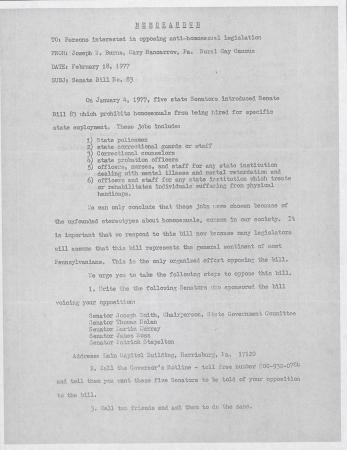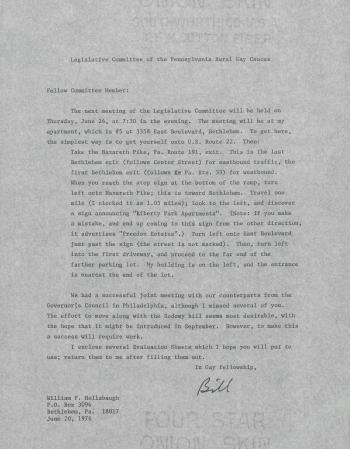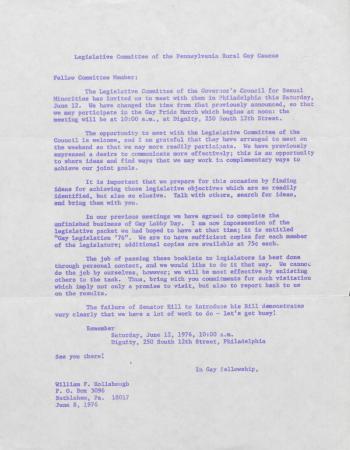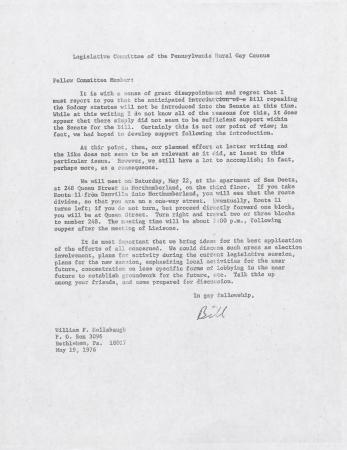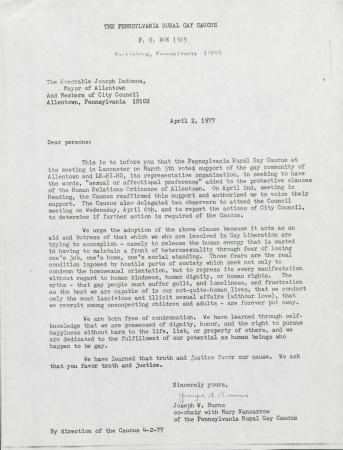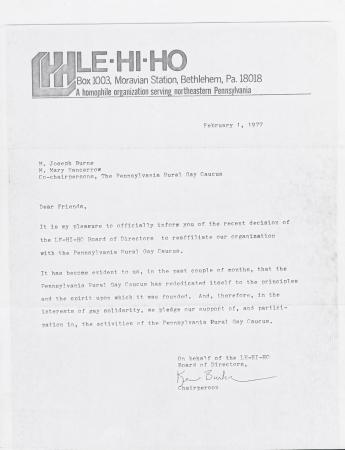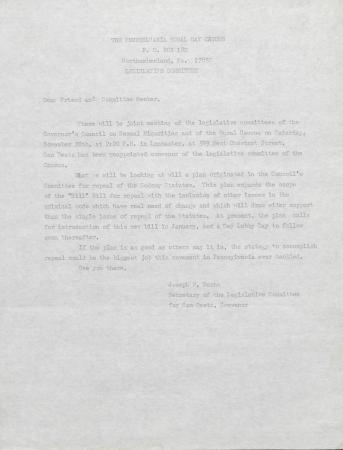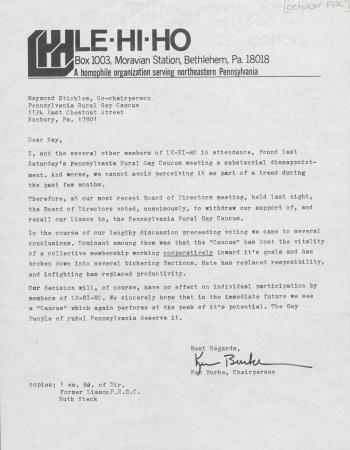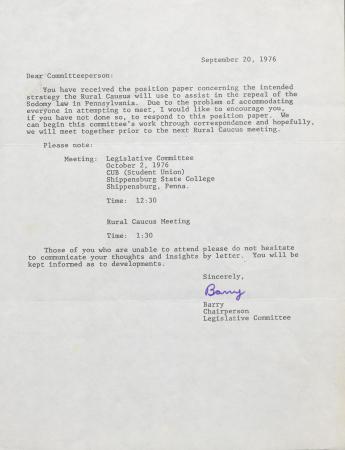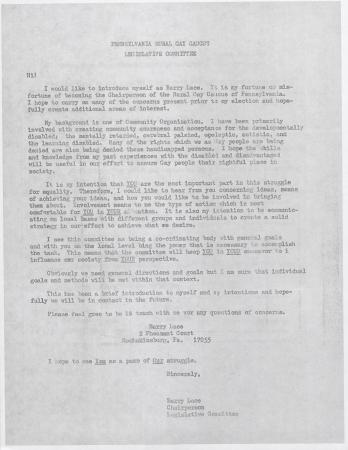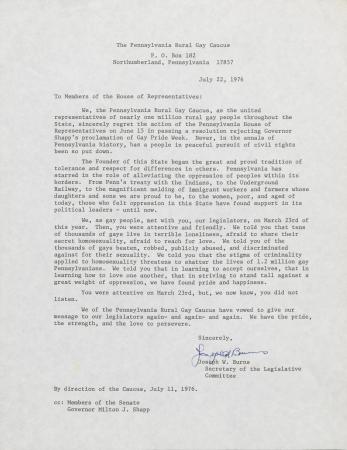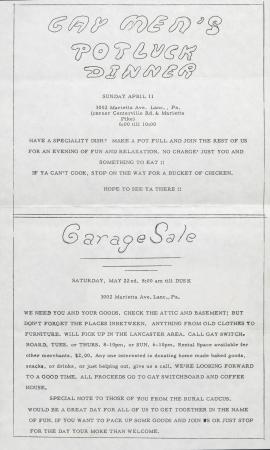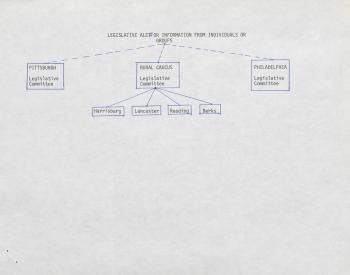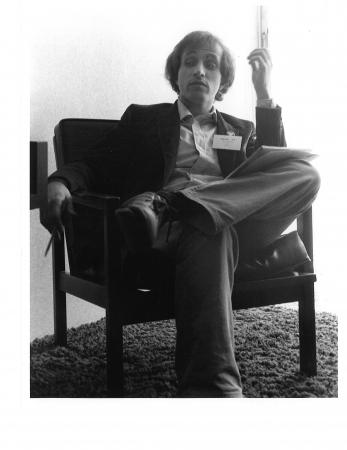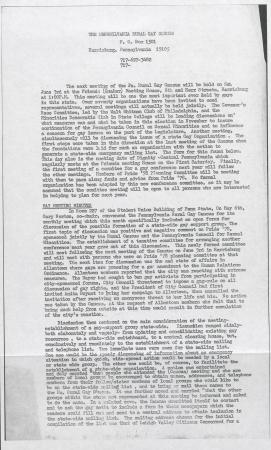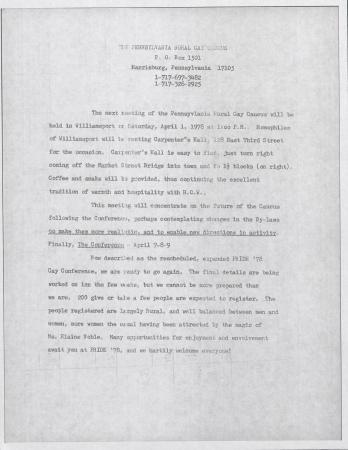PA Rural Gay Caucus
PA Rural Gay Caucus Legislative Committee Minutes - May 8, 1976
PA Rural Gay Caucus Legislative Committee Minutes - April 24, 1976
PA Rural Gay Caucus Memo - February 18, 1977
PA Rural Gay Caucus Memo - June 20, 1976
PA Rural Gay Caucus Memo - June 8, 1976
PA Rural Gay Caucus Memo - May 19, 1976
PA Rural Gay Caucus Memo - April 17, 1976
The Pennsylvania Rural Gay Caucus was “an association of interested individuals and groups, formed with the objective of promulgating the concerns and freedoms of gay people and all sexual minorities.” The report was used as a type of newsletter outreach to the Central PA LGBTQ community.
In this memo, Sam Deetz is explaining how to get to the location for the next meeting of the Legislative Action Committee.
PA Rural Gay Caucus Letter from the Editor - October 1976
The Pennsylvania Rural Gay Caucus was “an association of interested individuals and groups, formed with the objective of promulgating the concerns and freedoms of gay people and all sexual minorities.”
In this letter, Joseph Burns tells members of the departure of Lehigh Valley Homophile Organization (Le-Hi-Ho) from the group due to division among the group. He also goes on to talk about the protentional for growth and change within the caucus, starting with the next meeting, where they will decide if the caucus stays an organization or dissolves.
PA Rural Gay Caucus Letter - April 2, 1977
The Pennsylvania Rural Gay Caucus was “an association of interested individuals and groups, formed with the objective of promulgating the concerns and freedoms of gay people and all sexual minorities.”
In this letter, the Caucus is writing to the Majoyr of Allentown, PA in support of the adding sexual orientation preferences as a protection clause in the Human Rights Ordinance.
PA Rural Gay Caucus Letter - February 1, 1977
The Pennsylvania Rural Gay Caucus was “an association of interested individuals and groups, formed with the objective of promulgating the concerns and freedoms of gay people and all sexual minorities.”
In this letter, it is told that Lehigh Valley Homophile Organization (Le-Hi-Ho) has decided to reaffiliate with the PA Rural Gay Caucus.
PA Rural Gay Caucus Legislative Committee Letter - November 1976
The Pennsylvania Rural Gay Caucus was “an association of interested individuals and groups, formed with the objective of promulgating the concerns and freedoms of gay people and all sexual minorities.”
In this letter, Joseph W. Burns mentions the joint meeting between the Governor's Council on Sexual Minorities and the PA Rural Gay Caucus Legislative Committee. At this joint meeting, they will be looking at expand the "Hill" Bill to include more issues in addition to the repeal of the Sodomy Laws.
PA Rural Gay Caucus Letter - circa October 1976
The Pennsylvania Rural Gay Caucus was “an association of interested individuals and groups, formed with the objective of promulgating the concerns and freedoms of gay people and all sexual minorities.”
In this letter, Lehigh Valley Homophile Organization (Le-Hi-Ho) withdraws their support and recall their liaison from the PA Rural Gay Caucus due to breakdown of cooperation among members.
PA Rural Gay Caucus Letter - September 20, 1976
The Pennsylvania Rural Gay Caucus was “an association of interested individuals and groups, formed with the objective of promulgating the concerns and freedoms of gay people and all sexual minorities.”
In this letter, Barry Lace encourages committeepersons to respond to the position paper sent to them about the repeal of the Sodomy Laws.
PA Rural Gay Caucus Legislative Committee Letter - August 11, 1976
The Pennsylvania Rural Gay Caucus was “an association of interested individuals and groups, formed with the objective of promulgating the concerns and freedoms of gay people and all sexual minorities.”
This letter was written by Barry Lace introducing himself as the new Chairperson for the Caucus, specifically for the Legislative Committee.
PA Rural Gay Caucus Letter - July 22, 1976
The Pennsylvania Rural Gay Caucus was “an association of interested individuals and groups, formed with the objective of promulgating the concerns and freedoms of gay people and all sexual minorities.”
In this letter, the Caucus informs the PA House of Representatives it's disappointment in their action of passing a resolution that rejected Governor Milton J. Shapp's proclamation making June 12-19 as Gay Pride Week.
Identifying the Rural Gay Caucus - June 5, 1976
The Pennsylvania Rural Gay Caucus was “an association of interested individuals and groups, formed with the objective of promulgating the concerns and freedoms of gay people and all sexual minorities.”
In this flier, the Rural Gay Caucus is defined, organizations involved in the Caucus are listed, the statement of purpose provided, and the different committees within the caucus are explained.
PA Rural Gay Caucus Feedback Form - August 11, 1976
The Pennsylvania Rural Gay Caucus was “an association of interested individuals and groups, formed with the objective of promulgating the concerns and freedoms of gay people and all sexual minorities.”
Feedback form created to get community members' opinions on certain issues and involvement opportunities.
PA Rural Gay Caucus Event Flyer: Picnic and Garage Sale - April 11, 1976
The Pennsylvania Rural Gay Caucus was “an association of interested individuals and groups, formed with the objective of promulgating the concerns and freedoms of gay people and all sexual minorities.”
This is an event flyer promoting a Picnic and Garage Sale hosted by the Gay Switchboard of Lancaster.
PA Rural Gay Caucus Legislator Visit Evaluation Sheet - 1976
The Pennsylvania Rural Gay Caucus was “an association of interested individuals and groups, formed with the objective of promulgating the concerns and freedoms of gay people and all sexual minorities.”
This a form used to evaluate Legislators.
PA Rural Gay Caucus Chart - 1976
The Pennsylvania Rural Gay Caucus was “an association of interested individuals and groups, formed with the objective of promulgating the concerns and freedoms of gay people and all sexual minorities."
Flow chart of how information spreads for each Legislative Committee section of the PA Rural Gay Caucus.
LGBT History Project: LGBT-074 Anthony Silvestre Collection
Anthony Silvestre was born in 1946 in the Bronx in New York. He finished his final year of college at King’s College in Wilkes-Barre, PA, and then attended Pennsylvania State University (Penn State) as a graduate student.
Silvestre was introduced to gay rights while at Penn State. While there, he became active in an organization called the Homophiles of Penn State (HOPS). He became president of HOPS and subsequently met many of Pennsylvania’s leading activists. He was appointed Chair of the Pennsylvania Council for Sexual Minorities and became a leader in the Pennsylvania Rural Gay Caucus, which provided a forum for collaboration among numerous groups outside of the cities of Philadelphia and Pittsburgh.
LGBT Oral History 107: Anthony Silvestre
Anthony Silvestre was born in 1946 in the Bronx in New York. He grew up in a working-class, Italian neighborhood and is familiar with stigma. He began identifying as gay in the sixth grade, but went through school still in the closet. After high school, he entered a Catholic religious group in the Boston area called the Holy Cross Brothers. He left after three years due to his disillusionment with the church, not his sexual orientation. He finished his final year at King’s College in Wilkes-Barre, PA, and then attended Penn State as a graduate student.
Silvestre was introduced to LGBT rights while at Penn State, where he remained as student for five or six years. While there, he became active in an organization called the Homophiles of Penn State [HOPS], and, as president, met many of Pennsylvania’s leading activists. He was appointed Chair of the Pennsylvania Council on Sexual Minorities and became a leader in the Pennsylvania Rural Gay Caucus, which supported numerous groups across Pennsylvania. He was appointed Chair of the Pennsylvania State Council and supervised all of the subcommittees, one of which worked with the State Department of Education to create a gay high school in Philadelphia for the young gay kids from the Cuban Mariel Boatlift.
Silvestre worked with the department of Children and Youth Services to ensure that non-straight populations were not short-changed in the bureaucracy. He became executive administrator of the Eromin Center. Eromin [Ero: erotic, and min: minorities] is a center established to provide culturally competent mental health services.
Silvestre discusses how the State Office of Administration during the 80s effectively handled issues related to the AIDs epidemic, including writing policies and conducting sensitivity training around gay issues in various agencies such as the State Police. He interacted with the Governor and made policy with the governor’s aides, adding LGBT language into contracts and policies and requiring reports be generated concerning their efficacy, especially in regard to complaints that were made. He helped establish a community advisory board, probably one of the first in the country dealing with HIV.
Silvestre was hired at the University of Pittsburgh at the Pitt Men’s Study program to supervise their six-month grant sponsored by the NIH—and he still works there, thirty-plus years later. He is now working on non-discrimination policy and education for HIV individuals in nursing homes and home health care.
Silvestre is married and a practicing Buddhist. He has created a group for young LGBT Buddhists, and has organized HIV services through the Ball community by supporting SILK, which is a group for African American young, MSM and trans kids who are members of the Ball community.
PA Rural Gay Caucus Report - May 1978
The Pennsylvania Rural Gay Caucus was “an association of interested individuals and groups, formed with the objective of promulgating the concerns and freedoms of gay people and all sexual minorities.” The report was used as a type of newsletter outreach to the Central PA LGBTQ community.
In this report, the Caucus gives the location of the nest meeting in June and gives the meeting minutes from the May meeting. Minutes to note are:
- discussion of formation of a state wide gay support group
- postive and negative comments of Pride '78
- update on the Human Relations Ordinance in Allentown, PA
PA Rural Gay Caucus Report - March 1978
The Pennsylvania Rural Gay Caucus was “an association of interested individuals and groups, formed with the objective of promulgating the concerns and freedoms of gay people and all sexual minorities.” The report was used as a type of newsletter outreach to the Central PA LGBTQ community.
In this report, the Caucus gives the location for the next meeting in April and more information on the Rural Conference.

